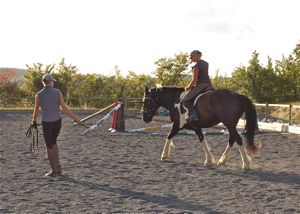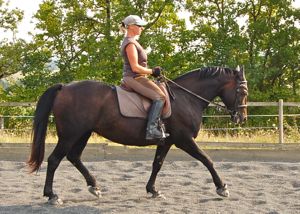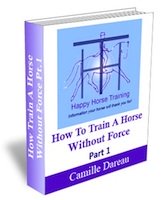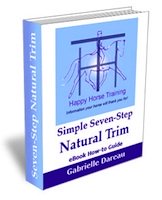

Horses see The World DifferentlySpotlight On Training: Horse Perception Horses have not developed their intellectual mind in the way humans have over thousands of years, but this does not mean they are less intelligent, only that their intelligence works in a different way. They are much more in tune with their body than most people. We have the same 'apparatus' in our nervous system to become aware of ourselves in a similar way to horses, but our evolution favoured a different specialization, and now our horses, when free to, have a much more sophisticated sense of their own physical well-being than we can often appreciate. One of the consequences of their different consciousness is that their mind is not full of thoughts in the same way as our is. Their mind is full of how they are feeling in each moment. Of course they have an excellent memory, but their memory is largely implicit, meaning that it is not based around thought in the way explicit memory is - it is the storage of internal states and automatic procedures, like feelings and associations and behaviours, e.g. galloping. The implications of these differences are fundamentally important to our approach when looking after horses. We can't just talk to them about things and find out their opinion in a way that is easy for us to understand. The fact that horses have such a strong sensory connection and implicit memory, but can't place it in time in the same way as us and understand it 'logically', means that their associations with us are very significant. Once they have made certain associations with tack, training procedures and riders, it is a long and difficult road back if we go the wrong way. These associations are memorized when they are either intense enough experiences or repeated often enough. Eventually your horse becomes an expression of your training, like a work of art, reflecting your integrity and your expertise or lack of it!
Fortunately for us horses are remarkably generous and emotionally enlightened so the way back is usually still open. 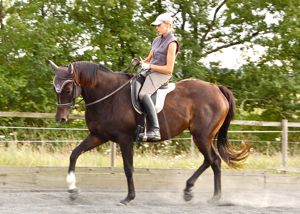
This ex-racehorse is making the journey back mentally and physically from a traumatizing career. Both her rediscovery of how to integrate with a herd and her dressage training, which gently re-patterns her nervous system, are some of the contributing factors which have re-established her personality and joie de vivre. The fact that horses perceive feelings and internal states which are not obscured by thoughts, explains the power of engagement in training: the unique synchronisation of certain muscles that transforms unbalanced motion into a harmonious equilibrium is a powerfully positive feeling for the horse, one which he in turn associates with the rider/trainer. This has a profound effect on the relationship between horse and human, making it one of reciprocal trust and pleasure, instead of dominance and restraint. Spotlight on Management: The Importance of a Happy Lifestyle We have found that the first step we can make to win our horses acceptance is to do everything we can to recreate for them their natural environment. We may have changed the physical appearance of horses fairly radically over the last several hundreds of years, but they have been evolving a mentality and a way of being over many millions of years. Unless we want to keep horses as living machines it is our responsibility to try to conceive of this. Horses are happy when they are able to move and associate directly with their own kind in a herd structure. They are also happy when they feel good physically, so their diet and the health of their feet and spine etc. are particularly important to them. Many of the traditions we follow now have been structured more around our needs as horse-riders than the needs of horses, but this leads us into more problems in the long run.
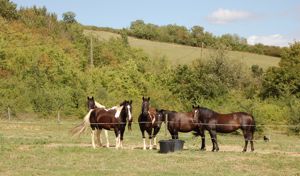
Winning her trust, and feeling the connection which is maybe only possible after going through so much together, is what having a horse is all about for us, and seeing her so happy with her herd is part of that. News Flash: Coming Soon on Happy Horse Training
The Seven-Step Natural Trim
Available in the coming weeks to purchase and download from HHT.
See Natural Horse Hoof Care for more on the intelligent barefoot alternative.
Click here to visit Happy Horse Training New! CommentsAnything to say about this page? Leave your comment in the box below. |
Join the Whole Horse Newsletter
HHT's free monthly newsletter giving you wide-ranging and intelligent insights into holistic horsemanship.
Just enter your details below to join.
Free bonus on the riding position with all new subscriptions: Ten Top Tips To Instantly Improve Your Connection With Your Horse.
Train Your Horse
The Holistic Way
How To Train A Horse Without Force is a unique guide to training horses through energetic connection and gymnastic training. Part 1 covers everything on the ground, from handling to the lungeing technique that develops strength, straightness and engagement. Comes with a free eBook supplement on Horse Trauma.
Click here for more details.
Do You Have
A Horse Story
To Share On HHT?
So many people have been through wonderful experiences with horses, whether in training or otherwise. If you've made a change in a horse's life - or one has made a change in yours - tell us about it here.
Learn How To Trim
Your Own Horse's Feet
The Simple Seven-Step Natural Trim is a comprehensive step-by-step guide to a cutting-edge barefoot trim. Click here to find out more.
